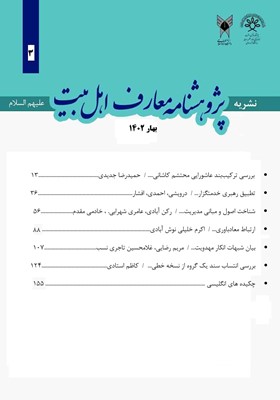تطبیق رهبری خدمتگزار با سیره قرآنی پیامبر(ص) درمدیریت مدارس
محورهای موضوعی : نشریه پژوهشنامه معارف اهل بیت علیه السلام
محمد حسین صادقی درویشی
1
,
رضا احمدی
2
,
آمنه افشار
3
*
![]()
1 - دکترای علوم قرآن و حدیث، استادیارومأمورآموزشی دانشگاه فرهنگیان لرستان
2 - کارشناسی ارشد مدیریت آموزشی
3 - دانشجوی دکتری علوم قرآن وحدیث، واحد کرج، دانشگاه آزاد اسلامی.
کلید واژه: مدیریت, قرآن, مدارس, پیامبر(ص), رهبری خدمتگزار,
چکیده مقاله :
دسترسی به تحقق مدیریت هدفمند، نیاز به مدیریتی موفق ومتعهد ویا به تعبیر دیگر رهبری خدمتگزار به عنوان یک ضرورت، محسوس میباشد. پژوهش پیش رو، با استفاده از دستاوردها و تجربههای دانش مدیریتی دنیا به بیان تطبیق شاخصهای رهبری خدمتگزار در مدارس ازمنظر عالمان این رویکرد، با سیره مدیریت قرآنی پیامبراکرم (ص) پرداخته است وشاخصهای رهبری خدمتگزار در مدارس را مشخص می نماید. روش بررسی در این پژوهش روش توصیفی-تحلیلی بوده و با تفحص درمنابع دانش مدیریتی دنیا و اسلامی به شاخصهای اصلی و مشترک پرداخته است. ضمن اینکه الگوی مدیریتی یک جامعه ایده آل اسلامی را با یکی از نظریههای مدیریتی دنیا مقایسه نموده است. هدف این پژوهش، مقایسه نوع نگاه وتجربه های مدیریتی دنیای معاصر در بیان شاخص های رهبری خدمتگزار در بستر مدارس با شاخصه های رهبری خدمتگزار با سیره مدیریت قرآنی آن حضرت است. یافتهها حاکی از آن است که ویژگیها واشتراکات ده گانه رهبری خدمتگزار، درسیره مدیریت قرآنی پیامبر (ص) دیده شده است. مضاف بر این اسوه های مدیریت قرآنی پیامبر(ص) با زیباترین شکل، درکلام الهی بیان شده تا اینکه رهبری و مدیریت، به گونه ای مطلق، اسیر افکارِ انحصارگرایی، شخصی، گروهی و منفعتطلبیِ جوامع نگردد
Access to the realization of purposeful management, the need for a successful and committed management or in other words "servant leadership" is felt as a necessity. The upcoming research, using the achievements and experiences of the world's management knowledge, has discussed the adaptation of the indicators of servant leadership in schools from the point of view of the scholars of this approach, with the Qur'anic management style of the Holy Prophet (pbuh) and the indicators of servant leadership in schools. specifies The method of investigation in this research is descriptive-analytical method and by examining the sources of world and Islamic management knowledge, it has addressed the main and common indicators. Besides, he has compared the management model of an ideal Islamic society with one of the management theories in the world. The purpose of this research is to compare the type of view and managerial experiences of the contemporary world in expressing the indicators of servant leadership in the context of schools with the indicators of servant leadership with the Quranic management of His Holiness. The findings indicate that the ten characteristics and commonalities of servant leadership have been seen in the Quranic management of the Prophet (pbuh). In addition to this, the Qur'anic management of the Prophet (pbuh) is expressed in the most beautiful way, in the divine word, so that the leadership and management, in an absolute way, does not become captive to the thoughts of exclusivity, personal, group and utilitarianism of the societies.
_||_

